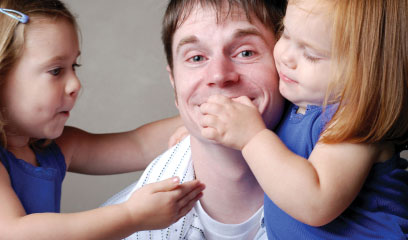 When Bernie Dorsey created a class to teach dads-to-be how to care for their newborns at Burien’s Highline Hospital in 1999, he had no idea how successful it would be. The real estate broker turned stay-at-home parent just wanted to share what he’d learned and teach future fathers what to expect after mom was done expecting.
When Bernie Dorsey created a class to teach dads-to-be how to care for their newborns at Burien’s Highline Hospital in 1999, he had no idea how successful it would be. The real estate broker turned stay-at-home parent just wanted to share what he’d learned and teach future fathers what to expect after mom was done expecting.
Twelve years later, his Conscious Fathering class is being taught by 65 instructors at 40 hospitals in 22 states.
“What we try to do is teach the guys about caring for their newborn baby in partnership with mom, so there’s no ‘This is your job, this is my job.’ It’s about today’s dad being a partner, not a secondary parent,” Dorsey says. “It’s pretty difficult to do that if you’ve never held a baby.”
Although Dorsey estimates that 85 percent of the men he’s taught over the years have had no experience with a child younger than 6 months old, he quickly gets them up to speed with classes that cover all the basics: eating, burping, changing, sleeping, crying and how to hold the baby.
The classes not only explain that crying is normal, but also give men ways to soothe an upset baby and calm themselves when they feel frustrated. Having a plan to deal with the frustration helps reduce the likelihood of shaken baby syndrome, a frequently fatal injury that can occur when a baby is shaken violently.
Dorsey says his approach not only helps reduce the number of cases of shaken baby syndrome, it also turns potential abusers into strong advocates for the health of their children.
“The mission all along has been to change guys’ trajectory. If you provide relevance to their role as they are entering that first season of fatherhood, they’re more inclined to enter into a permanent relationship with that child,” Dorsey says.
Considering that more men these days are expressing interest in being involved with their children, that’s the good news.
The bad news is, once they finish Dorsey’s program, most dads are left out in the cold. While moms have many programs that provide support, information and other resources, dads are pretty much on their own.
Few services for dads
It is indeed ironic. After many studies showing the difference a father’s presence makes in raising children and numerous government campaigns to get guys more involved, men have begun to come around. If the interest in Dorsey’s Conscious Fathering program is any indication, they’ve been doing so for quite some time. In fact, Dorsey feels stay-at-home dads are the fastest-growing parenting population.
Unfortunately, there aren’t many places for fathers to get support unless they’re in trouble in the court system or involved in a special-needs community. Divine Alternatives for Dads Services (DADS), for example, provides a range of services, but for struggling or troubled fathers. These services include case management, child support management and parenting plan assistance.
Even statistics that track fatherhood involvement tend toward the negative. There are plenty of studies linking fatherlessness to poverty rates, behavior problems, alcohol and drug abuse, high school dropout rates and crime. Yet there are some studies indicating the positive effects of what one dad’s website calls “fatherfullness.” But numbers on the trend of increasing involvement are harder to come by.
However, figures dating back more than two decades do indicate the start of a trend. A Fortune magazine poll taken in the late 1980s (cited on fathers.com) indicates that 30 percent of fathers interviewed had passed up a job because it would cut into their family time. The website also mentions a 2007 careerbuilder.com survey showing that 38 percent of dads would accept a salary cut to spend more time with their kids.
Why, then, are so few services for dads in place today?
One reason could be cultural. Although times have changed, attitudes often have not. Even with more men becoming primary caregivers, many people aren’t sure what to make of a man who shows up with children in tow in the middle of the workweek.
Work-at-home dad Matt Villano, a northern California freelance writer, says he often notices hints that people don’t take him seriously as a father.
“It’s subtle,” he says. “Instead of talking about ‘changing the baby’s diaper,’ they might say, ‘When the baby’s diaper is changed,’ implying I’m not the one who’ll change it. Also, when I’m out and about with the baby, I always get the ‘Daddy’s home from work, eh?’ comment. That really bugs me.
“I do think a lot of times people assume that because I’m the baby’s primary caregiver during the day, I must have gotten laid off from my job.”
In some cases, men may be their own worst enemies, because of the way they’ve been socialized, says Greg Schell, director of the Washington State Fathers Network, which serves fathers of children with special health care needs. While mothers seem to bond easily and readily compare notes about childcare issues, men don’t.
According to Schell, dads won’t connect unless they are invited to a group that’s just for men and able to talk about subjects that might bring them into conflict with their spouses if they were in a group for men and women.
“We’re supposed to be tough, we’re supposed to be able to handle issues on our own. You have a kid with a disability? Guess what. That’s not going to happen,” Schell says.

Overcoming stereotypes
While fathers of special-needs children face different issues than dads of more typical kids, one thing they have in common is the need to overcome societal stereotypes.
“Maleness in our society is generated by Hollywood. You’re tough, you’re good looking, and all this stuff, and most guys aren’t,” Schell says. “To say, ‘Hey, I need some help on some things’ is not the easiest thing to do, and most organizations do not provide resources, because the thinking is ‘Men pretty well take care of themselves, don’t they?’”
Ask most service providers if they believe only a woman can effectively raise a child, and they’ll likely express surprise at the question, but that’s not the message their actions are sending, according to Vincent DiCaro, vice president of public affairs for the National Fatherhood Initiative (NFI).
When expecting couples tour hospitals, for example, moms get a bagful of gifts, and dads get nothing, DiCaro said. He also points out that some hospitals don’t even mention the word “father.”
At the same time, Dr. Kyle Pruett, the author of Partnership Parenting, says he’s heard of male pediatricians asking fathers who bring in a child for an office visit, “Could we get your wife on the phone? I have some questions I have to ask her.”
Even agencies that say they are looking for ways to get fathers through their doors overlook small, telling details, DiCaro says. They may drop the word “mothering” from the title of a course and replace it with the word “parenting,” but neglect to swap out mom-centric materials for more inclusive lessons. Others have lobbies with women’s magazines on the tables and posters of moms and kids on the walls, but no images of fathers with children anywhere in sight.
“It’s not enough to take agency materials and print it on blue paper. It’s about changing the messaging,” said DiCaro, who compares it to trying to sell Old Spice antiperspirant to men versus selling deodorant to women. “You just have to take a different approach. When you’re talking to moms and kids, it’s one sort of marketing approach. When you’re trying to get dads in the door, you have to use different words, different tactics.”
New focus on fatherhood
Fortunately for dads, things are starting to change, even if at a glacial pace.
“There are organizations that are becoming really hungry to do this work. Programs definitely do come to us and say they want to help dads and say they are not able to get them in the door,” DiCaro says.
That’s why the NFI provides a “Father-Friendly Checkup” on its website. The check list not only gives agencies a way to grade their performance, it also allows NFI to provide the customized assistance and training that helps make organizations more sensitive to the needs of dads.
The program has trained more than 7,000 people across the country since 2002, DiCaro said.
The federal government has also gotten in on the act. President Barack Obama, who was raised without a father, considers fatherhood so important that he proposed a $500 million Fatherhood, Marriage and Families Innovation Fund in 2010. Currently, the program is getting $150 million per year, which is also the president’s 2012 request.
The cash comes at a time when interest in fatherhood is growing, says Jack Edgerton, executive director of the Parent Trust for Washington Children.
“What I’m seeing is that things are starting to gain a new momentum. We’re at the beginning of a generational shift about how we view fatherhood,” Edgerton says. “Men are hungry for these opportunities and find fellowship with other men in their role as fathers. They’re seeking to become better dads.”
Dorsey sees it as part of a slow evolution in response to the trend. Instead of being frustrated with the current state of affairs, he says he hopes the gradual changes will inspire men to take heart in the growing interest. It’s just taking a while for existing institutions to catch up with the new reality.
As he puts it, “It’s an interesting time to be a dad.
David Volk is a stay-at-home dad to two toddlers and a freelance writer who specializes in writing about parenting, travel, food and business. He’s also the author of The Cheap Bastard’s Guide to Seattle and the blog cheapbastardseattle.com.
 Beyond the new dad
Beyond the new dad
Resources for new fathers:
- Children’s Home Society of Washington offers parent education classes and a fatherhood group that meets twice a month.
- Divine Alternatives for Dads Services provides a range of services for fathers.
- The Healthy Marriage and Responsible Fatherhood Coalition of Lakewood has Quenching the Father’s Thirst program.
- Parent Trust for Washington Children has fathers’ groups that meet twice a week in South Seattle.
- Wellspring Family Services, an agency that deals with domestic abuse issues, offers services such as Men’s Domestic Violence Intervention and DV Dads.
- For more resources in cities throughout the state, check out the Parent Trust for Washington Children's resources database.











